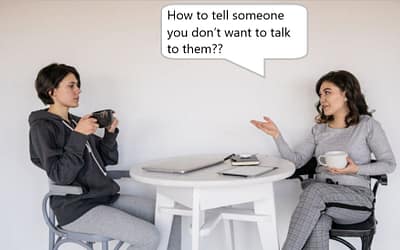Welcome to Loopward
Learn How to Improve Social Skills & Understand Mental HealthSocial Skills Training
Learn about the art of conversation, build relationships, and confidence.
Mental Health Resources
Gain an understanding of how mental health impacts your social interactions.
Read our Blog Posts
50 methods on how to tell someone you don’t want to talk to them
Have you ever been at a loss for not knowing how to tell someone you don’t want to talk with them? Well, we’ve created 50 examples you can use to tell someone you don’t want to talk to them.
“I Don’t Have Any Friends” 27 Ways to Meet New Friends
We’ve all felt frustrated with friends. Some of us might say, “I don’t have any friends!” Well, there are several reasons you might be feeling this way. Here we talk about why and what it means.
“I don’t have any friends and I’m depressed” 5 reasons why and what to do
Navigating through life without friends can cast a long shadow on your heart, often leading to depression. It’s a heavy silence, filled with moments where you long for connection, for a laugh shared with someone who gets you, or a companion in times of challenge. But within this quiet, there is also a space where you can rediscover yourself, find new ways to reach out, and forge connections. The path to overcoming loneliness and depression is personal and profound. It’s about learning to extend a hand, whether it’s to join a community group, seek out like-minded individuals online, or find solace in creative expression. This is your starting point for the journey to a fuller, more connected life, where friendships can blossom and the weight of depression can lift, bit by bit.
Get 8 Free Tools to Become Socially Confident
Subscribe to our community and get a HUGE discount on our course, Next Level Conversation
How to Improve Social Skills:
A Quick Guide for Introverts and Beyond
We’ve all been there—awkward silences, stumbling over words, or feeling out of place in a social setting. Whether you identify as an introvert or simply want to improve your social skills, you’re not alone.
Now, we’ll dive into how to develop social skills and explore how this journey can positively impact your mental health.
How to Improve Social Skills: Starting Steps
Improving social skills doesn’t happen overnight, but there are actionable steps you can take:
Self-Awareness: Before interacting with others, understand your own strengths and weaknesses. This self-awareness can guide you in social situations.
Active Listening: Pay close attention to what the other person is saying. This will help you contribute meaningfully to the conversation.
Body Language: Your non-verbal cues like eye contact and posture speak volumes. Mastering these can help you appear more confident.
How to Improve Social Skills for Introverts
If you’re an introvert, social interactions might seem especially challenging. Here are some tailored tips:
Small Talk: Start with low-risk topics like weather or common interests. This will help you ease into the conversation.
Boundaries: Know your limits and don’t be afraid to set boundaries. This will help you engage more genuinely.
Safe Spaces: Identify settings where you feel most comfortable and practice your social skills there first.
The Connection to Mental Health
You might wonder, “How does all this relate to mental health?”
The answer is simple but crucial: Your ability to navigate social settings impacts your self-esteem, stress levels, and overall emotional well-being.
Improving your social skills can alleviate social anxiety and contribute to better mental health.
Take Charge of Your Social Skills and Elevate Your Mental Health Today!
Improving social skills is not just for climbing the social ladder; it’s about enhancing your quality of life. Whether you’re learning how to improve social skills as an introvert or seeking general improvement, these changes can significantly impact your mental health.
So start taking actionable steps today to develop your social prowess and enrich your life in ways you never imagined!


